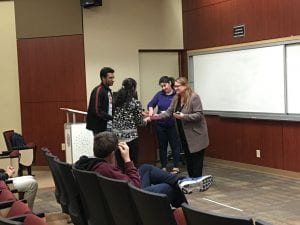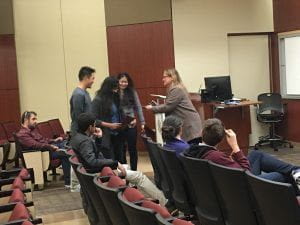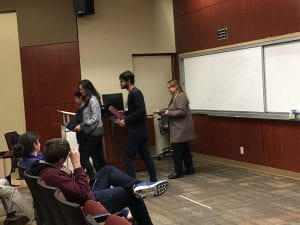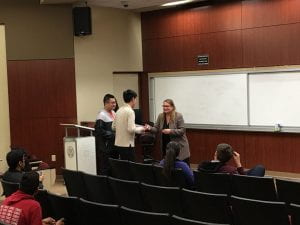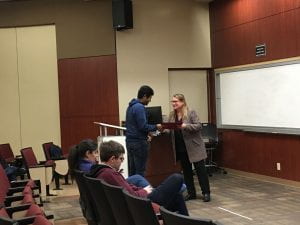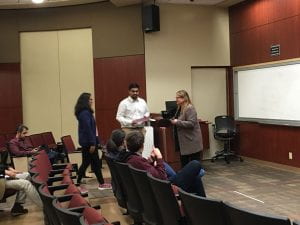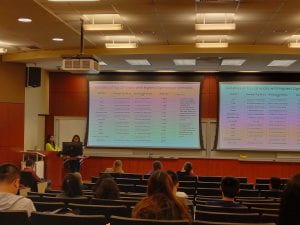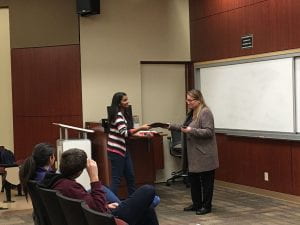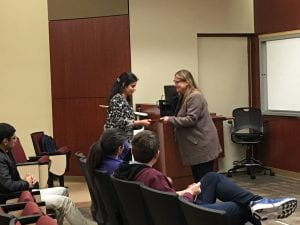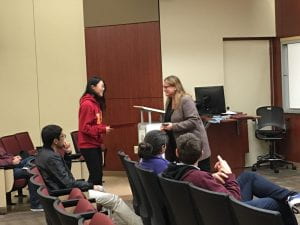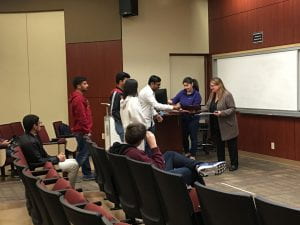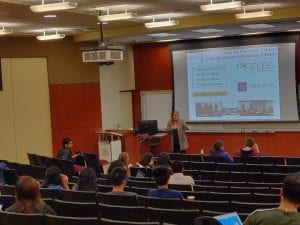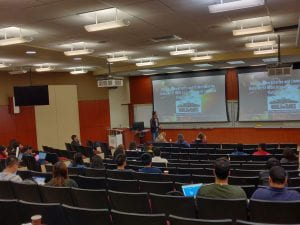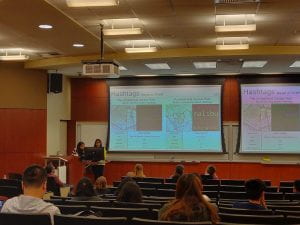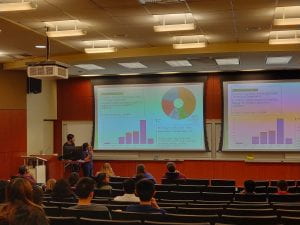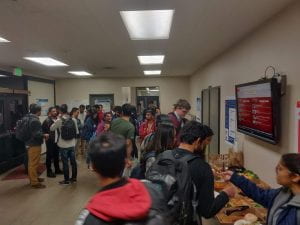On Nov 25, 2019, DataFest co-chairs Andres Abeliuk, Deborah Khider, and Fred Morstatter organized the final presentations of the DataFest Fall 2019 CKIDS x GRIDS projects. Students presented their progress, results, and plans for further work.
During the Fall semester, faculty and students across the university collaborated across twenty data science projects that span a spectrum of interdisciplinary topics (see here for detailed project descriptions):
- Understanding Internet communities through video games
- Measuring population-level nutrition and dietary habits from Instagram
- Tracking coastal change at Catalina Island
- Data mining past climates
- Understanding human-environmental perceptions using multi-biometric signals in the built environment
- Mining side effects in cancer treatment
- Modeling the career trajectory of music artists
- Automated generation of paper authors
- A visual analytic toolkit for cultural biases
- Modeling uncertainty in drought data
- Automated time series analysis
- Creating and visualizing a linked knowledge base of crime data
- Building an open catalog of integrated datasets for Los Angeles
- Building sports data knowledge graphs
- Tell us where it hurts
- Capturing provenance of data analyses
- Data infrastructure for student projects
- Detecting deep fakes
- Measuring pollution benefits from congestion pricing initiatives
- Learning to Connect: Modeling Social Network Dynamics and Evolution by Imitation Learning
Other projects presented included “Analyzing data about the foster care system”, an innovative Ph.D. dissertation project from the School of Social Work.
CKIDS director Yolanda Gil and GRIDS president Samar Haider gave several awards to recognize outstanding achievements:
- Jinney Guo, Natalie Jonckheere, Donna Kim, Calvin Liu, Malika Seth, and Tanay Shankar received the award for Best Interdisciplinary Data Science Team, for their work on the project: Identify, Characterize and Understand the Behavior of Sybil Account Activity in Online Multiplayer Games
- Yi-Hsin Chung, Sankareswari Govindarajan, Justin Ho, Sangeeth Koratten and Kevin Tran received the award for Best Project Presentation, for work on the project: Mining side effects in cancer treatment
- Wei-Fan Chen, Keerti Bhogaraju, Prateek Athreya, and Sameeksha Mahajan received the award for Best Data Science Poster, for work on the project: Tracking coastal change in Catalina Island
- Tieming Sun, Xingyu Wei, and Ruiyu Zhao received the award for Best Data Science Open and Sharing Practices “For publication of project materials in open shared repositories, and using existing data resources to improve the tools”, for work on the project: Automated generation of paper authors
- Xingyu Wei received the award for Best Interdisciplinary Data Scientist “For creative ideas to develop additional capabilities that go far beyond the initial project definition”, for work on the project: Automated generation of paper authors
- Shenoy Pratik Gurudatt received the award for Best Data Science Developer “For rapidly learning to use a complex image processing pipeline and use it successfully for a new project, showing solid understanding of deep learning principles and data science frameworks”, for work on the project: Detecting deep fakes
- Shravya Manety and Abhilash Pandurangan received the award for Best Project Achievement “For substantial work to calculate and visualize the Standard Precipitation Evapotranspiration Index (SPEI) to understand droughts in Sub-Saharan Africa”, for work on the project: Modeling uncertainties in drought data
- Ian Choi, Shagun Gupta, Divyatmika Lnu, and Nina Thiebaut received the award for Best Data Science Collaboration Practices “For working closely with others in the project, creating thorough documentation, and stepping in to fill in gaps when needed”, for work on the project: Measuring population-level nutrition and dietary habits
- Ian Choi received the award for Best Data Science Team Leader “For contributing to all aspects of the project, seeking domain relevance of all results, and mentoring others to learn new skills”, for work on the project: Measuring population-level nutrition and dietary habits
- Malika Seth received the award for Best Data Science Teamwork “For fruitful collaboration with a team of communication students to analyze complex data about online games to understand social behaviors”, for work on the project: Understanding Internet communities through videogames
- Yilei Zeng received the award for Best Data Science Insight “For research on new social network metrics to identify duplicate/fake accounts in collaboration with social scientists to frame the problem”, for work on the project: Understanding Internet communities through videogames
- Yuan Syn, Shubham Banka, Gurav Gupta and Manoj Muralidhara received the award for Best Cyberphysical Data Science, for work on the project: Potential use of multi-occupant bio-signals for high performance building control mechanisms
DataFest will be held again in Spring 2020. Some of the projects above will continue, and new projects will be proposed by faculty. All these opportunities will be announced on the CKIDS website and GRIDS newsletter.

